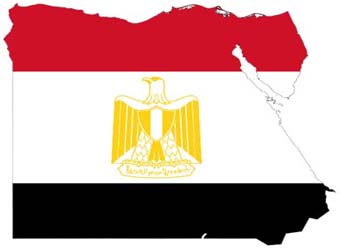Egyptian authorities on Tuesday charged two Israelis and two Egyptians with forming an espionage ring for Israel, the second such trial to be called for in a month.
Prosecutor General Hisham Barakat alleged that the two Israelis are Mossad officers, and that two Egyptians, including a woman, helped provide them with information. The Egyptians are in custody and authorities have issued arrest warrants for the Israelis, although prosecutors do not know their whereabouts.
Prosecutors alleged in a statement that the Egyptian man had offered his services to Israel in 2009, and the Israeli officers provided training on gathering information and the use of sophisticated technology to send information to Israel.
The woman, the prosecution says, is a magazine journalist who helped the first defendant. The two received money and gifts in return for their information, according to the investigation. When they confessed and gave up the names of Israeli officers, Barakat issued arrest warrants for the Israelis.
Earlier this month, the trial of eight people including five Israelis and three Egyptians on similar charges began in a court in the Suez Canal city of Ismailia. The Israelis were tried in absentia.
The trials are taking place amid near-daily reports of plots in the media, with foreign parties regularly accused of conspiring with the Islamist Muslim Brotherhood group to destabilize Egypt.
The army-backed interim government has cracked down on the group following the July 3 ouster of Islamist President Mohamed Morsi, who is himself standing trial on a range of charges including conspiring with the Palestinian militant group Hamas.
Meanwhile, the al-Qaida-inspired Ansar Beit al-Maqdis group claimed responsibility for a bomb attack on an Egyptian bus in the desert peninsula that killed three South Korean tourists and an Egyptian driver.
The Champions of Jerusalem said in a statement posted on militant websites late Monday that one of its “heroes” carried out Sunday’s bombing in Taba.
“God helped your brothers in Ansar Beit al-Maqdis to assign one of its heroes to blow up the tourist bus that was heading to the Zionist entity (Israel) as part of our economic war attacks on this traitorous hireling regime, which plundered the nation’s wealth,” the statement said
Egyptian officials have called the attack a suicide bombing, but the statement did not contain the usual phrasing, such as the word “martyr” or “God bless his soul” used in previous claims for attacks in which the bomber also died.
The statement criticized the Egyptian military’s intensified operations in the Sinai Peninsula along the border with Israel that has targeted the militants’ hideouts and vehicles.
The Egyptian regime is “killing innocent people, imprisoning women, demolishing their houses, looting their properties and flattening the lands at the border with the Zionist enemy as well as displacing their owners merely to please their Jewish masters and protect their alleged borders,” it said.
The group, based in Sinai, has claimed responsibility for previous attacks, but until now they have targeted primarily police and the military. The attacks have spiked since Morsi’s overthrow, spreading to cities of the Nile Delta and the capital, Cairo.
The group claimed responsibility for downing a military helicopter in Sinai in late January, killing all five crewmembers, and the assassination earlier this month of a senior interior ministry aide. It also says it carried out a powerful truck bomb outside Cairo’s main security directorate.
The authenticity of the statement could not be verified but it was posted on al-Qaida-affiliated websites.
Meanwhile, a roadside bomb exploded at a checkpoint close to the restive town of Sheikh Zuwayed near the Rafah border crossing into Gaza, injuring four army conscripts.
In Cairo, interim President Adly Mansour issued a decree empowering the heads of universities to suspend students found engaging in or inciting acts of sabotage that disrupt classes or damage property.
Suspensions would be enforced following an investigation by a disciplinary board comprised of university faculty and state judges. Students have clashed with security forces for months following Morsi’s ouster. The clashes have steadily grown more violent with both sides using firearms, resulting in the deaths of students and the injury of policemen.
Source: The Associated Press



